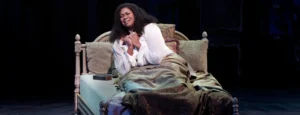
Photo: Ken Howard/Met Opera
March 7, 2023, saw the second performance of the third cast in the Metropolitan Opera’s run of Verdi’s “La Traviata,” starring Angel Blue.
Michael Mayer’s lavish production sets the stage for the unfolding tragedy in ways that both amplify and obscure certain aspects. From the overture, we’re presented with a tableau of the moment following Violetta’s death before she rises from the bed and walks among them as a ghost. Rather than focus on her infirmity, this new starting point makes a scenic argument for the triumph of life over death while still recognizing the latter’s presence and impact.
An Angel Gets Her Wings
Basking in the glow of her Met role debut just three days prior, Angel Blue made for a resplendent Violetta. From her introduction, she displayed an ease and richness of tone that warmed her initial façade towards Alfredo before their ensuing romance drew out the most of her for their duet “Un di felice.” Whether in jubilance or in frailty, Blue found abundant colors to illuminate the texture; with soaring phrases, ecstatic roulades, and a breathtaking, delicate cadenza to lead into “Sempre libera,” she truly delighted in this vocal and emotional showcase.
Following her scene with Germont Sr., Blue’s frantic parting with Alfredo was breathtaking as her inner conflict drew out her phrases until her climactic cries of “amami, Alfredo!” This glorious moment was fittingly met with a fade to sunset lighting as their time together drew to a similar close. Her time throughout the final act ached with a crushing pathos as Violetta’s illness reached its peak. Her rendition of “Addio, del passato” saw her use all her strength in a tender prayer that rode over the dirge-like chords as Blue slowly fell to the floor to deliver the poignant close, retaining ample stability and clarity. Her sense of delicacy continued through her second wind as Alfredo returned for their duet and reconciliation. It made it all the more touching when she finally seemed to shrug off her illness in her final moments. With delectable tone and fervor, Blue has no doubt breathed new life into this iconic role.
Opposite blue was Ukrainian tenor Dmytro Popov in the role of Alfredo. His opening lines as he stepped out of the party crowd carried with a firm tone that suggested a slightly more mature Alfredo; this quality lent itself nicely to the protective way he entreats for Violetta’s health and happiness. His initial coolness warmed up in time for the brindisi, and his voice remained at the forefront of the texture even among the dense chorus and later during his offstage lines during Blue’s “Sempre libera.” The effect of this new love was heard in Popov’s rendition of “De’ miei bollenti spirit,” which carried with notable softness directed toward the sleeping Violetta. When he learned of her arrangements to sell her possessions, this shock lent a nice urgency to his phrases as he boldly leaped at this chance to support her; this charge was finely tinged with bitterness during the latter half of the second act as he raged against Violetta and the crowd at large.
Another tremendous success of the evening was Artur Rucinski as Giorgio Germont. After his initial impression of Violetta melted, he displayed a breadth of fatherly affection with a power and clarity that almost belied his smaller frame. Despite the seeming connection reached between their characters, with both artists wonderfully in sync, their directions, much like rigid social conventions, kept them at a rather arbitrary distance which blunted the progress they had made with each other. That he did not embrace her “as a daughter” at their first meeting could be understood, but the meeting of their hands in the third act did not feel like enough to show the familial love that had grown.
His rendition of “Di provenza il mar” was a highlight of the performance, with Rucinski’s warm cantabile wonderfully complimenting the repetitive structure of the text and imagery as he appealed to his son’s nostalgia. Rucinski drew nearly show-stopping applause for this number, and when he turned his anger on the vengeful Alfredo moments later, a few gasps could be heard from the audience as he readied to strike the latter with his cane. While some of the directions worked against him, Rucinski made the very most of his time onstage and was easily the most compelling Germont that I have heard live.
Conducting the Met Orchestra, Maestro Nicola Luisotti led with exuberance and flair, playing well into the significance of the orchestra in relating and augmenting the characters’ feelings. While the Act one party rang with great energy, the chords just before the brindisi felt notably rushed for comedic effect as the party turned their heads about almost eerily quickly. More private moments were explored with great affection, as heard from the tragic heights of the illness motif in Acts one and three or the utter weight and authority which introduces Giorgio Germont. Maestro Luisotti did not lack ways to find new color within this classic work while still drawing the most out of the singers.
Can’t Wilt What’s Gilt
When I last saw this production four years ago, I critiqued the set’s gilded nature for its inability to change meaningfully as Violetta’s condition worsens. While I still believe something is lost in this, there’s something of a statement made in masking one’s illness with glamour and excess. This production, much like Violetta herself, lives very much in the moments of greatest passion.
Tuesday’s cast had all the makings for a wonderful night of music, and they excelled despite some challenges within the production and even some challenges within the audiences. There were multiple instances of iPhone timers going off, people recording the performance, and someone’s ringtone even sounding from the upper levels during Act three’s “Parigi, o cara.” The artists proved that over any obstacle, planned or otherwise, art and love prevail.



